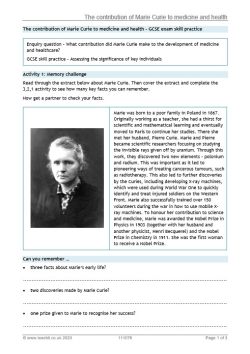The contribution of Marie Curie to medicine and health – GCSE exam skill practice
Last updated: 15/11/2023

This worksheet contains three activities to help students practise their GCSE exam skills in the context of a unit on medicine or health:
- Students read a short text about Marie Curie and do a 3,2,1 activity to test their recall.
- They assess key facts to determine whether Marie Curie had a short-term impact or a long-term impact on medicine and health.
- Finally, they write an answer to the following exam-style question: 'Explain the significance of Marie Curie in the development of medicine in Britain.'
This resource is great for exam practice or in a lesson for International Women's Day on 8 March.
An extract from the text about Marie Curie:
To honour her contribution to science and medicine, Marie was awarded the Nobel Prize in Physics in 1903 (together with her husband and another physicist, Henri Becquerel) and the Nobel Prize in Chemistry in 1911. She was the first woman to receive a Nobel Prize.
All reviews
There are no reviews yet. Have you used this resource?Review this resource
